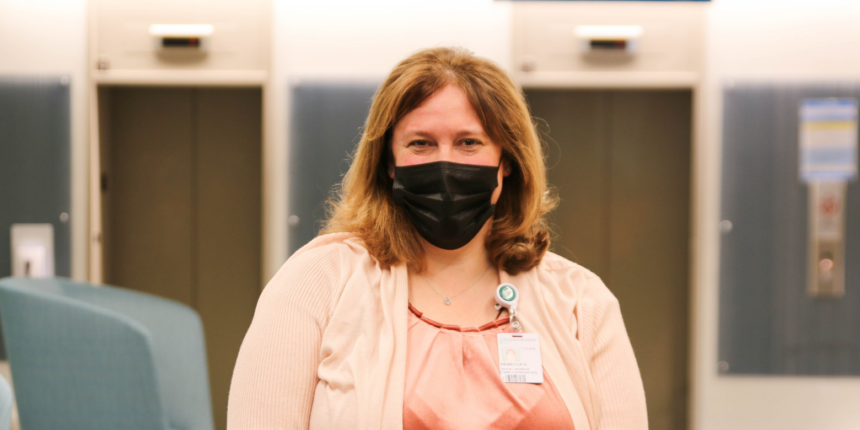Staff Profiles
When it Comes to Patient Experience, Medical Social Workers Deliver

Meet Rebecca Villineau, a Southcoast Health Medical Social Worker
It was a cold evening last December and a typical night in the St. Luke’s Emergency Department – very busy. The bays were full, and staff were caring for dozens of patients and their loved ones.
In the midst of the hectic action during the evening shift, Rebecca Villineau, LICSW, a medical social worker who has been with Southcoast Health for 15 years, was called to attend to the needs of an elderly woman.
“She was sitting by herself. Alone. Her husband had just passed away,” Rebecca says. “He had a heart attack earlier while shoveling snow and was brought to the hospital by ambulance, but he didn’t make it.”
The work of the medical team was over, but Rebecca’s work had just begun.
“I sat with her until she was ready to leave. We talked, but mostly I listened to her story,” Rebecca says. “The woman told me about her husband and who he was. In her grief, she told me she had been mad when he didn’t answer his cell phone while out in the snow. Then discovered when she went to look for him that he had collapsed outside.”
Medical social workers are available to give people their full attention
Providing support to patients and loved ones in their time of need and listening to what they want to say, even when those conversations are riddled with regret and remorse, are an important part of Rebecca’s job and the job of all social workers at Southcoast Health.
“The emergency department can be hectic with staff going back and forth attending to patients,” Rebecca says. “People need to be shown love and respect, and to know their life matters. Patients and families remember when they are treated with patience, respect and dignity.”
It is important to give people time and not rush them, she says. This is especially true for families and loved ones when there is a sudden death in the emergency department and when someone in the hospital is nearing the end of life.
Rebecca finds that many people are not sure they should call the social worker or feel like they don’t want to be a bother. She frequently gets comments such as, “I didn’t know if I should call you,” and “I don’t know if I’m calling the right person.” Only later for them to say, “I’m so glad I called.”
She tells people, “Your situation is important. Don’t ever hesitate to call or ask for the social worker.” Even if she cannot help someone directly, Rebecca will find out who can assist them. “Social workers are trained to be problem solvers and to get people the information they need.”
“Rebecca exemplifies what it means to be a social worker,” says Rebecca Carney, LICSW, Rebecca Villineau’s supervisor. “She is compassionate, empathetic and a strong advocate, especially for underserved populations.”
Social workers can help in many ways and in many kinds of situations
At Southcoast Health, in addition to giving their support and presence, social workers in our hospitals and emergency departments perform a host of critical functions. They intervene in psychiatric emergencies, assess patients’ psychological state and their social and environmental situations, screen for alcohol and substance use, assess for trauma, get involved in crucial patient and family communication, connect people with needed information and resources, work in tandem with nurse case managers on discharge planning (especially in complex situations such as homelessness), and much more.
Southcoast Health has social workers in the hospital or on-call 24/7.
“Rebecca is highly knowledgeable in all aspects of social work from clinical diagnosis, homelessness resources, to setting up compassionate hospice care in the patients’ homes,” adds Rebecca C. “She offers help to these patients in a way that perseveres their dignity and autonomy.”
“I’m constantly learning. Every year at Southcoast is like another year in a master’s program. At Southcoast, social workers are utilized for what they are meant to do,” Rebecca V. says.
A demanding profession, social work requires self-care and discipline
Medical social work, like other health professions, is demanding. It requires social workers not only taking care of the people who come through the door seeking help, but also taking care of themselves. Rebecca V. says that the social work team supports one another. When handling crises, there’s no time to process in the moment. “I connect with my social work colleagues as much as I can. And I reach out for supervision when I need it.”
“It’s important to take care of myself, eat and sleep well, so I can be there for others,” she says. “I’m also careful not to bring things home in my head.”
This was not always the case for Rebecca, but she’s learned that over the years that thinking about her work and patients while not on the job does not serve anyone well.
This was never truer than during the pandemic. It required staff to be mindful of their own well-being while meeting the challenges of patient care. For all its difficulties and challenges, however, the pandemic made us better social workers and care coordinators, Rebecca V. says.
“The pandemic didn’t slow down homelessness and mental health crises. It magnified these issues,” she says. Social workers had to work “harder, faster, and be better detectives in finding and connecting people to resources. I am so proud to be part of the social work team and the ED staff. The way staff responded to the pandemic has been phenomenal, and it took a lot of courage.”
